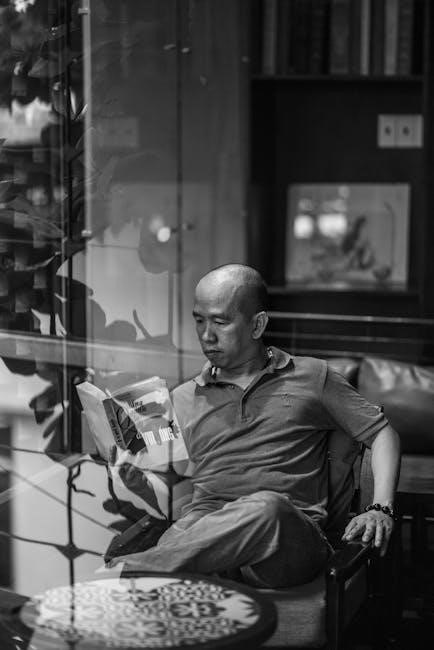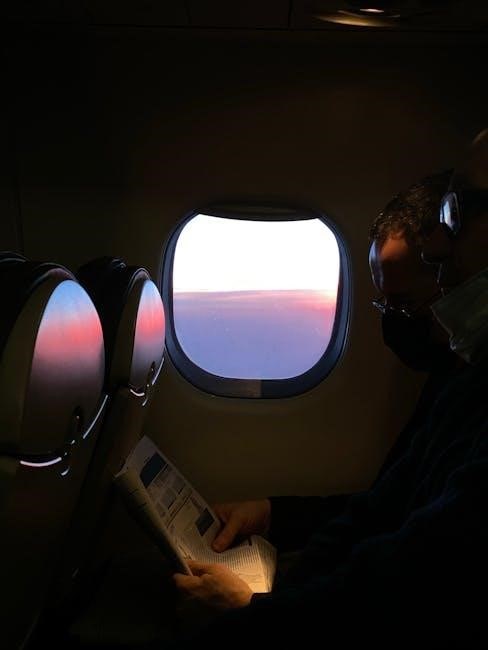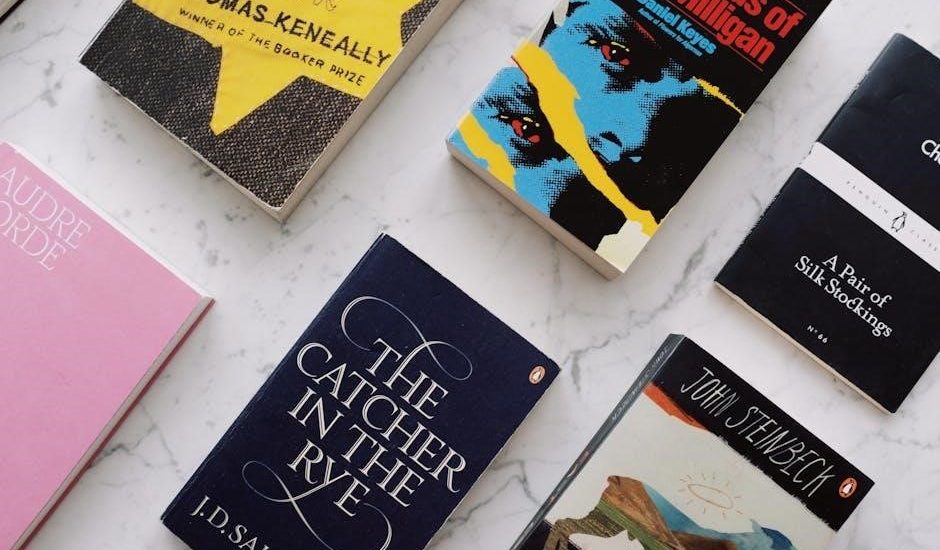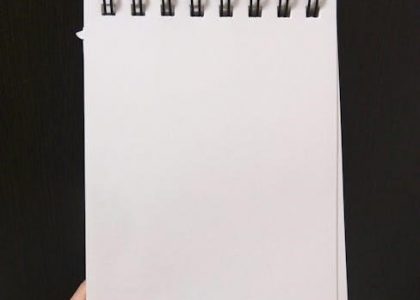1.1 Title: “The Lord of the Flies Book PDF”
William Golding’s debut novel, Lord of the Flies, explores human nature through a gripping tale of young boys stranded on a deserted island. Published in 1954, it remains a timeless classic, sparking discussions on civilization, savagery, and morality. The book’s enduring popularity has led to its availability in various formats, including PDF, making it accessible to modern readers worldwide.
Lord of the Flies, written by William Golding, is a renowned novel exploring human nature through a group of boys stranded on an island. The title reflects themes of power and savagery, symbolized by the “lord of the flies.” The book’s PDF format allows readers to access this timeless story digitally, ensuring its enduring relevance and accessibility for modern audiences worldwide.
William Golding’s Lord of the Flies is a classic novel that explores the darker aspects of human nature through the story of boys stranded on an island. Its themes of savagery, civilization, and morality resonate deeply, making it a cornerstone of literary studies. The availability of the book in PDF format has further enhanced its accessibility, allowing readers to engage with this timeless tale in a convenient digital form.
Background and Publication
William Golding’s Lord of the Flies was first published in 1954 by Faber and Faber, marking his debut. Initially overlooked, it later became a literary classic, exploring themes of human nature; The 70th-anniversary edition celebrates its enduring impact.
2.1 Publication Details of “Lord of the Flies”
Lord of the Flies was first published in 1954 by Faber and Faber. It marked William Golding’s literary debut, initially receiving limited attention but later gaining acclaim. The novel’s 70th-anniversary edition highlights its enduring influence. Today, the book is widely available in PDF format, ensuring accessibility for modern readers while preserving its timeless themes and insights into human nature.
2.2 Historical Context of the Novel
Published in 1954, Lord of the Flies reflects post-World War II anxieties about human nature and society. William Golding’s experiences in the Royal Navy during WWII influenced his exploration of savagery and power dynamics. The novel’s release coincided with Cold War tensions, resonating with fears of societal collapse and the inherent darkness within humanity, making it a timeless commentary on civilization’s fragility.

Plot Summary
A plane crash strands British schoolboys on a deserted island, far from adult supervision. Initially, they attempt to create a utopian society but descend into chaos and savagery.
3.1 Setting of the Story
The story unfolds on a remote, uninhabited tropical island during an unspecified war. Dense jungles, rocky shores, and a lagoon create a vivid backdrop. The isolated setting symbolizes a microcosm of society, where the boys’ true nature emerges. The absence of adults and civilization amplifies their primal instincts, driving the plot’s descent into chaos.
3.2 Main Characters and Their Roles
Ralph, the protagonist, embodies leadership and civility, striving to maintain order. Jack, the antagonist, represents savagery and power, obsessed with hunting. Piggy, the intelligent voice of reason, advocates for democracy. Simon, the moral compass, uncovers the truth about the beast. Roger enforces Jack’s will, while Samneric provide loyalty and comic relief. The Naval Officer symbolizes civilization’s return, contrasting the boys’ primal descent.
3.3 Key Events and Turning Points
The story begins with a plane crash, leaving a group of boys stranded. Ralph is chosen as leader, focusing on building shelters. The appearance of the “beast” creates fear, shifting priorities to hunting. Simon discovers the beast is a dead pilot but is killed. Jack’s tribe steals Piggy’s glasses, leading to his tragic death. A Naval Officer arrives, ending their primal descent.
Themes and Symbolism
Lord of the Flies delves into themes of civilization vs. savagery, power struggles, and humanity’s inherent darkness. The conch shell symbolizes order, while the beast embodies fear, reflecting the boys’ primal descent and the island’s moral decay.
4.1 The Theme of Civilization vs. Savagery
In Lord of the Flies, Golding explores the clash between civilization and savagery through the boys’ descent into chaos. Initially, they maintain order with rules and the conch shell, but as fear and power struggles emerge, their primal instincts dominate, revealing humanity’s fragile grip on civility and the ease with which it can revert to savagery.
4.2 The Symbolism of the Conch Shell
The conch shell symbolizes order, democracy, and civility in Lord of the Flies. Found by Ralph and Piggy, it is used to summon meetings and ensure only one speaker at a time. Its power fades as the boys’ behavior becomes more savage, and its destruction marks the collapse of their civilized society, emphasizing the loss of moral structure.
4.3 The Significance of the Beast
The “Beast” in Lord of the Flies represents the primal fears and unknown terrors inherent in human nature. Initially, the boys believe it is a physical creature, but it evolves into a symbol of their inner savagery. The Beast’s presence drives the group to paranoia and violence, revealing how fear can dismantle rationality and lead to chaos.
Characters Analysis
Ralph, Jack, and Piggy are central figures, each embodying distinct traits. Ralph symbolizes order, Jack represents primal instincts, and Piggy signifies reason, collectively mirroring human nature’s complexity.
5.1 Ralph: The Protagonist
Ralph, the fair-haired leader, represents order and democracy. His struggle to maintain civility amidst chaos underscores his internal conflict. As the protagonist, Ralph symbolizes humanity’s inherent goodness, yet his eventual descent into primal instincts reveals the fragility of morality. His journey from innocence to realization is central to the novel’s themes, making him a compelling and complex character.
5.2 Jack: The Antagonist
Jack Merridew, the choir leader, evolves from a disciplined boy to a power-hungry hunter. His obsession with killing pigs symbolizes his descent into savagery. As the novel progresses, Jack’s desire for control and dominance clashes with Ralph’s leadership, embodying the conflict between primal instincts and civilized behavior. His transformation highlights the inherent darkness within human nature, making him a formidable antagonist.
5.3 Piggy: The Voice of Reason
Piggy, the intelligent and rational member of the group, represents wisdom and logic. Despite his physical limitations and mockery, he consistently offers practical solutions, advocating for the conch shell’s authority. His idea of using the signal fire to alert rescuers highlights his foresight. Piggy’s eventual demise symbolizes the destruction of reason and civility, underscoring the novel’s exploration of human nature’s darker aspects.

Reception and Popularity
Lord of the Flies has sold over 20 million copies worldwide, becoming a cultural phenomenon. Its exploration of human nature resonates deeply, making it a favorite in schools and among readers. The novel’s enduring appeal lies in its universal themes, ensuring its relevance across generations and solidifying its place in literary history.
6.1 Initial Reception of the Novel
When first published in 1954, Lord of the Flies received mixed reviews. Critics praised its unique narrative and thought-provoking themes, while others found its dark tone controversial. Despite initial skepticism, the novel gradually gained recognition for its bold exploration of human nature, eventually becoming a celebrated classic in world literature.
6.2 The Novel’s Enduring Popularity
Lord of the Flies has maintained its popularity due to its timeless exploration of human nature. Its themes of civilization vs. savagery resonate universally, appealing to readers across generations. The novel’s inclusion in school curriculums and its adaptation into various formats, including PDF, have further cemented its place as a modern classic, ensuring its relevance in contemporary literature and education.
The Book in PDF Format
Lord of the Flies is widely available in PDF format, offering readers a convenient way to access William Golding’s timeless exploration of human nature and societal norms.
7.1 Availability of “Lord of the Flies” in PDF
The Lord of the Flies PDF is readily available online, accessible through various platforms like eBook stores, libraries, and educational websites. Readers can download or read it digitally, ensuring easy access to Golding’s profound exploration of human nature, making the novel convenient for modern readers seeking a digital format.
7.2 Benefits of Reading the Book in Digital Format
Reading Lord of the Flies in PDF offers unmatched convenience, allowing readers to access the novel anytime, anywhere. Digital formats enable adjustable font sizes, easy navigation, and annotations, enhancing readability. They also save physical space, reduce environmental impact, and often cost less than physical copies, making the classic more accessible and enjoyable for modern readers while preserving its profound message.
7.3 Legal Aspects of Downloading the PDF
Downloading Lord of the Flies in PDF requires adherence to copyright laws. Many editions are protected under copyright, making unauthorized downloads illegal. Readers should opt for licensed digital copies from reputable sources like publishers, libraries, or online retailers to ensure legality and support authors and creators. Always verify the source to avoid copyright infringement.

Cultural and Literary Impact
Lord of the Flies is a British literary classic, profoundly influencing modern literature with its exploration of human nature, morality, and societal structures. Its themes resonate globally, inspiring numerous adaptations, including films, plays, and scholarly analyses, cementing its legacy as a cornerstone of 20th-century literature.
8.1 The Novel’s Influence on Literature
Lord of the Flies has profoundly shaped modern literature, offering a darker perspective on human nature. Its exploration of civilization vs. savagery has inspired countless authors, influencing dystopian and young adult genres. The novel’s allegorical style and moral complexity have set a benchmark for literary excellence, making it a foundational text in 20th-century literature and a continuous source of scholarly and creative inspiration worldwide.
8.2 Film and Stage Adaptations
Lord of the Flies has been adapted into films and stage plays, further cementing its cultural impact. The 1963 film by Peter Brook and the 1990 adaptation by Harry Hook brought the novel’s haunting themes to the screen. Stage productions have also captured its essence, ensuring the story remains relevant and accessible to new audiences, complementing its availability in PDF format for modern readers.

Writing Style and Techniques
9.1 William Golding’s Writing Style
William Golding’s writing style in Lord of the Flies is vivid and immersive, employing allegory and irony to explore complex themes like savagery and civilization, drawing readers into the boys’ primal world.
William Golding’s writing style in Lord of the Flies is characterized by allegory and irony, with vivid prose that immerses readers in the island’s primal world. His exploration of psychological depth reveals the boys’ descent into savagery, reflecting broader themes of human nature. The PDF format ensures his unique storytelling is accessible and engaging for modern readers.
9.2 Use of Allegory and Irony
Golding employs allegory to symbolize human society through the boys’ island experience. Irony underscores the contrast between their civilized intentions and eventual descent into savagery. The conch shell and beast represent order and fear, while the novel’s tragic end highlights humanity’s inherent flaws, making the PDF version a powerful tool for analyzing these literary elements in depth.

Legacy and Anniversary Editions
Celebrating the 70th anniversary, special editions and manuscripts of Lord of the Flies were released, showcasing the novel’s enduring influence and William Golding’s literary legacy.
10.1 Celebrating the 70th Anniversary
To mark the 70th anniversary of Lord of the Flies, special exhibitions featuring Sir William Golding’s manuscripts and correspondence were held. These events highlighted the novel’s historical significance and its continued relevance in modern literature, offering fans a unique glimpse into the creation of this timeless masterpiece.
10.2 Special Editions and Manuscripts
Limited editions of Lord of the Flies have been released to commemorate its 70th anniversary. These include annotated manuscripts, rare drafts, and exclusive forewords, offering readers deeper insights into Golding’s creative process. Digital versions, such as PDFs, now feature these special elements, enhancing accessibility for modern readers while preserving the novel’s literary legacy.

Educational Significance
Lord of the Flies is widely studied in schools for its exploration of human nature, morality, and societal structures. The PDF format enhances accessibility, enabling students to highlight and annotate key themes, fostering critical thinking and deeper engagement with Golding’s timeless narrative.
11.1 The Novel in School Curriculums
Lord of the Flies is a cornerstone of high school and college curriculums worldwide. Its exploration of human nature, morality, and societal structures aligns with educational goals, fostering critical thinking and ethical discussions. The novel’s themes of leadership, power, and civilization versus savagery resonate deeply with students, making it a valuable tool for teaching literature and broader life lessons.
11.2 Teaching “Lord of the Flies” in Classrooms
Teachers use Lord of the Flies to explore themes like leadership, morality, and human nature. Classroom activities often include group discussions, character analysis, and reflective writing. The novel’s complex characters and plot twists encourage critical thinking and ethical debates. Its availability in PDF format allows educators to easily share annotated versions, enhancing teaching and student engagement with the text.

Critical Reviews and Analysis
Lord of the Flies has received widespread critical acclaim for its profound exploration of human nature. Scholars praise its allegorical depth, while some critics argue its themes are overly pessimistic, sparking debates about its moral complexity and timeless relevance in literary discourse.
12.1 Positive and Negative Reviews
Critics widely acclaim Lord of the Flies for its deep exploration of human nature and moral complexity. Many scholars praise its allegorical richness and thought-provoking themes. However, some critics argue that the novel’s pessimistic outlook and graphic violence may not appeal to all readers, while others celebrate its unflinching honesty and timeless relevance in sparking essential discussions about society and humanity.
12.2 Scholarly Analysis of the Novel
Scholars have extensively analyzed Lord of the Flies for its profound exploration of human nature, civilization, and morality. The novel’s use of allegory, symbolism, and psychological depth has been praised for its complexity. Academics highlight how Golding’s narrative challenges readers to reflect on innate human tendencies, societal structures, and the duality of order versus savagery, making it a cornerstone of literary study and discourse.

Comparisons with Other Works
Lord of the Flies is often compared to other literary works exploring human nature, such as The Hunger Games and The Giver, for its themes of survival and societal collapse.
13.1 Similar Themes in Other Novels
Lord of the Flies shares themes with other novels like The Hunger Games and The Giver, exploring survival, societal collapse, and human nature. These works delve into moral dilemmas, leadership struggles, and the tension between order and chaos, mirroring Golding’s examination of civilization’s fragility. Such parallels highlight universal concerns about humanity’s capacity for both cooperation and destruction, resonating across literary genres and eras.
13.2 “Lord of the Flies” vs. Modern Literature
While Lord of the Flies remains a classic, modern literature often explores similar themes with fresh perspectives. Contemporary works like The Hunger Games and Divergent delve into survival, societal collapse, and moral dilemmas, yet they emphasize diverse characters and technological contexts. Golding’s timeless themes of human nature and power struggles continue to resonate, bridging gaps between classic and modern storytelling.

Reader Engagement and Discussions
Lord of the Flies sparks lively debates in online forums and book clubs, with readers analyzing its themes, characters, and relevance to modern society. Group discussions often delve into the novel’s deeper meanings, fostering reflection on human nature and societal structures.
14.1 Online Forums and Communities
Online forums and communities actively discuss Lord of the Flies, with readers sharing insights into its themes, characters, and symbolic elements. These platforms foster deeper engagement, allowing users to exchange perspectives and analyze the novel’s relevance to modern societal issues. The availability of the book in PDF format has further fueled these digital conversations, making it easier for readers worldwide to participate.
14.2 Book Clubs and Group Discussions
Book clubs and group discussions provide a platform for readers to delve into the themes and complexities of Lord of the Flies. These gatherings encourage participants to share perspectives on the novel’s exploration of human nature, morality, and societal structures. The availability of the book in PDF format has made it easier for groups to access and engage with the material, fostering deeper discussions and connections among readers.
Lord of the Flies remains a timeless exploration of human nature, society, and morality. Its availability in PDF format ensures accessibility for modern readers, preserving its impact and relevance in understanding humanity’s duality, as envisioned by William Golding.
15.1 The Timeless Appeal of “Lord of the Flies”
Lord of the Flies captivates readers with its universal themes of human nature, morality, and societal collapse. The novel’s exploration of civilization versus savagery resonates across generations, making it a cornerstone of literature. Its availability in PDF format ensures that William Golding’s powerful narrative continues to engage modern readers, sparking reflections on humanity’s inherent duality and ethical struggles.
15.2 Final Remarks on the Novel’s Impact
Lord of the Flies leaves a profound impact as a literary masterpiece, shaping discussions on human nature and morality. Its themes of societal collapse and inherent savagery resonate universally, influencing literature, education, and popular culture. The novel’s inclusion in school curriculums and its availability in PDF format ensure its timeless relevance, inspiring new generations to reflect on humanity’s complexities and ethical dilemmas.





